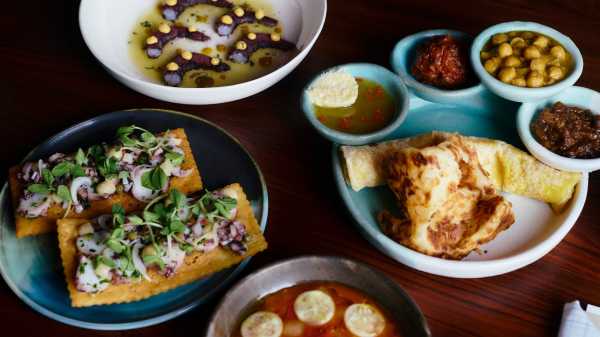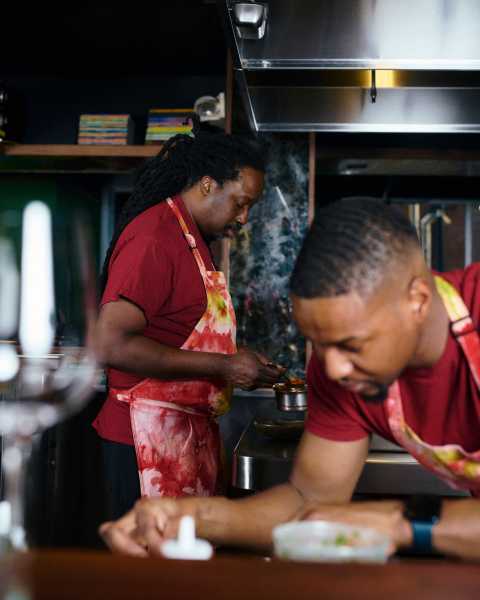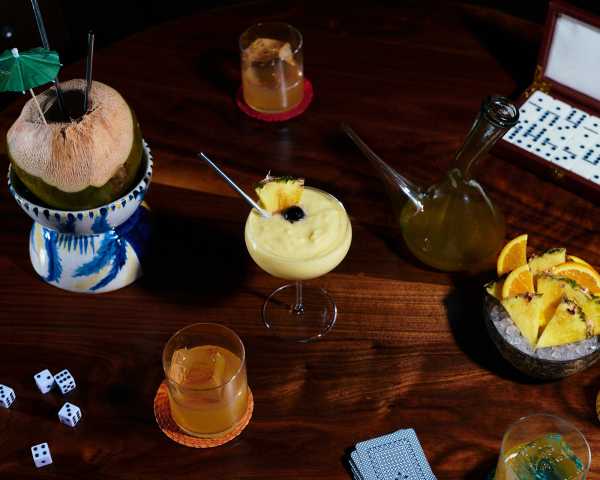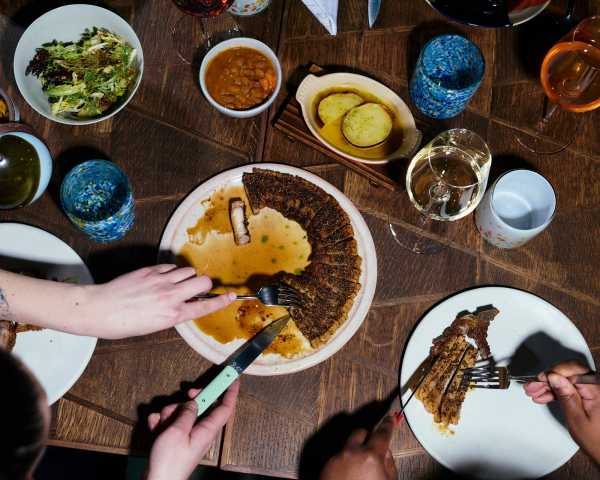
Save this storySave this storySave this storySave this storyYou’re reading the Food Scene newsletter, Helen Rosner’s guide to what, where, and how to eat. Sign up to receive it in your inbox.
If you ever had the pleasure of eating at Momofuku Ko, the wonderful, ambitious, and sometimes sort of compellingly bizarre tasting-menu restaurant that closed in 2023, it can be a little disorienting to visit Kabawa, a new fine-dining Caribbean spot occupying Ko’s former space in the East Village. The room, once decorated in severe tones of black and gray, has received a warm makeover, with bright paint and tropical mosaics. But the large open kitchen that takes up most of the room is the same—with cooks’ stations encircling a central vent that’s dramatically cantilevered, like the funnel of a cruise ship—as is the seating, much of it arranged around a sweeping U-shaped counter. One of the things I remember most clearly from Ko was the peculiar way that certain smells rolled around the boxy space like billiard balls—a cloud of sweet lychee in the air by a few window tables, or a whiff of Searzall butane hovering over the dead center of the dining counter. At Kabawa, the tumbling kittens of aroma include fresh yeast, green cucumber, and a perpetual bouquet of toasty curry leaves.
Little exists to inform you that you’re in a Momofuku joint—not a mote of branding nor a trace of David Chang, the company’s überfamous chef and founder. For kremlinologists of the Momofuku empire (and there are more of us out there than you might think), this is both notable and unsurprising: Chang has always seemed to have a deeply ambivalent relationship with his own success. (In “Eat a Peach,” his memoir, published in 2020, he writes rawly about irresistible tendencies toward self- and other kinds of destruction, including bouts of rage directed at his employees and loved ones.) Over the past few years, Chang has stepped back from day-to-day operations at Momofuku; the company, which now includes an ever-growing portfolio of grocery products, is run by its C.E.O., Marguerite Zabar Mariscal. Kabawa’s chef, Paul Carmichael, is a longtime veteran of Momofuku, and was recently announced as overseeing all of the group’s restaurants—a signal, perhaps, that the company (which has contracted over the past half decade to some half-dozen spots) is interested in anchoring its identity on something more than the stature of its founder. At Kabawa, one of the only signs of the place’s connection to Chang is a stack of old issues of Lucky Peach, the brilliant, defunct food magazine he co-founded, resting on a high-up kitchen shelf.

The chef Paul Carmichael, at left, is a native of Barbados and a veteran of the Momofuku brand.
Carmichael, a native of Barbados, cooked under blue-chip chefs such as Marcus Samuelsson and Wylie Dufresne before being hired by Chang, in 2010, at the now closed midtown Momofuku restaurant Má Pêche. After five years there, he moved to the other side of the world to take over at Momofuku Seiobo, in Sydney, Australia, where he evolved the menu’s European-Asian-Whatever palate to reflect his particular passion for the food of the Caribbean. Seiobo raked in awards before closing during the pandemic. Chang told me recently that in Australia Carmichael became “like David Hasselhoff”: a mega-celeb and a national treasure, recognized everywhere he went (not to mention one of a relatively tiny number of prominent Black people in Aussie public life).
In the U.S., Carmichael’s profile remains considerably lower-key, even among food people, but Kabawa—and Bar Kabawa, a more casual companion spot next door with a killer lineup of tiki drinks and a dizzying variety of Caribbean patties—makes clear that he possesses both formidable creativity and a fairly luminous charisma. Whether presiding in the kitchen or joking easily with customers, he is the restaurant’s gravitational center: wearing the staff uniform of a tie-dye apron, his long locs secured with a bandanna, he exudes the quiet affability of someone who knows he’s showing you a good time. At Bar Kabawa, when regulars walk in the door—or someone orders a particularly exciting cocktail, or he’s just kind of in a spirited mood—he rings a shiny brass bell.

Bar Kabawa offers cocktails such as planter’s punch, a frozen piña colada, and rum served inside a coconut.
The menu at Kabawa is, likewise, fun and attractive in an unassuming way. There are a handful of other high-end restaurants in New York currently serving island food—Omar’s Kitchen, on the Lower East Side, is sceney and vivacious, and you can spend a pleasant evening over ackee-and-salt-fish eggrolls at Mango Bay, a new spot in Fort Greene—though none speak in quite the same aesthetically rigorous vernacular as Kabawa. Its level of finesse invites certain comparisons to Tatiana, the glittering Lincoln Center restaurant run by Kwame Onwuachi, another chef asserting the haute-cuisine artistry of food born of Black cultures. But whereas Tatiana provides a survey of Black gastronomic experiences in New York, from braised oxtail to a bodega-inspired Cosmic Brownie with ice cream, Kabawa tells a story of the Caribbean itself, rather than its diaspora.
Carmichael’s approach to Kabawa’s menu—a three-course prix fixe, with fairly substantial extras thrown in here and there—feels both evangelistic and sneakily scholarly about Caribbean food. (As a student at the Culinary Institue of America, Carmichael wrote a senior thesis focussed on Caribbean ingredients and the Atlantic slave trade.) You’ll encounter “dog sauce,” a parsley-green hot sauce from the French Antilles, dressing silken circles of octopus atop a nutty breadfruit tostón. When the chef drops a plate bearing five soft arcs of royal red shrimp, served raw, with a coating of burgundy sorrel powder and fiery dots of a scotch-bonnet emulsion, he might not mention that the crustaceans were caught just hours earlier, off the coast of Montauk, but he will refer to Jamaica’s winding coastal highways, where roadside venders sell plastic baggies of cooked shell-on shrimp dyed neon-red with pepper and food coloring, to which this precisely plated dish is an homage.

The Puerto Rican pork dish chuletas can can and various accompanying sides.
During one of my visits, after I asked about the provenance of the kitchen’s jewel-like tropical fruits, Carmichael mentioned that it took him a while to earn the trust of Big Mac, the owner of Labay Market, in Brooklyn, one of the city’s finest sources for Caribbean imports, including produce from a sixty-acre farm in Granada owned by Big Mac’s family. “I had to prove that I was for real,” Carmichael said, with a smile. Later on in the same meal, emboldened by rum, I asked him why Kabawa didn’t serve any jerk. (The menu’s boudin-like “jerk” duck sausage is styled with scare quotes.) He explained that he hasn’t been able to get his hands on pimento wood, whose sweet, herbaceous smoke gives the dish its characteristic flavor. Then he added, growing serious, that the famous Jamaican cooking style gets enough attention already. “I love jerk; I’m writing a book about jerk,” he said. “But everyone knows jerk. I put it on the menu, everyone’s going to order it, and I won’t get to show you everything else from all the other islands.”
For all its thoughtful flourishes, a meal at Kabawa feels easygoing and joyous. The kitchenside seating lacks the prayer-rail worshipfulness of many chef’s counters; the evening unfolds at a considered pace, providing time enough to savor the details, but not so long as to leave you antsy. To begin, there’s an Indo-Caribbean “bread course” of a chewy paratha and a thick, chickpea-flour-dusted roti, alongside an array of dips and spreads including an eggplant chutney cooked with tamarind, curried chickpeas reminiscent of Trinidad’s famous doubles, and a snow-white wodge of cultured butter in a pool of piquant yellow-pepper jelly. The main courses include black bass with rich coconut curry, the fish’s skin chicharron-crisp; an elegant brick of shredded goat meat in a fiery-hot sauce Creole; and a terrifyingly enormous chuletas can can, a cudgel-like Puerto Rican cut of pork that encompasses belly, rib, and loin, with scored skin flaring out like the skirt of a dancer mid-twirl. (It serves two, and carries a seventy-five-dollar supplemental charge; I haven’t yet worked up the nerve to try it.) The entrées are served with family-style sides including a bowl of silken beans and another of chewy long-grain rice, plus a tangle of frilly salad greens and a slice of starchy Japanese sweet potato swimming in pineapple vinegar. Between the savory courses and dessert, a cook might come by to present a palate-cleansing bite of fruit, such as whole sweet tamarinds in their pods, or sticky white trapezoids of soursop.
Helen, Help Me!
E-mail your questions about dining, eating, and anything food-related, and Helen may respond in a future newsletter.
Though there’s no shortage of high points at Kabawa—among them a rainbow-sprinkle-studded baton of flan so dense it verges on cheesecake—the restaurant’s success lies less in the strength of any individual dish than in the ebullient sum of its parts. (Still, I must adamantly recommend a scotch-bonnet fried chicken that was on offer during one of my visits, and hopefully will return soon.) The over-all electricity of the restaurant—its confidence, its clarity, its idiosyncrasy—feels true to the early years of Momofuku, and makes Kabawa a tropical bulwark against New York’s recent retreat into the anesthetizing comforts of French food and steak houses. The kitchen is still working some things out: a coconut turnover, an ultra-sweet Barbadian dessert listed on the menu for two, is bread-loaf-sized and more properly feeds four or five; a green-banana pastel covered in a variety of sautéed mushrooms is just sort of boring. But for me, at least, an almost euphoric pleasure comes from simply being there, pumped full of life by the colors and the smells, by watching Carmichael and his chef de cuisine, Max Guillaume, intently plate a dish of cassava dumplings in spicy red gravy, by conspiring with a server to get one of the terrific off-menu piña coladas sent over from Bar Kabawa next door. They might ferry over some patties, too, if you ask nicely, but it’s worth going over there yourself, some different night, when you’re in the mood for impeccable daiquiris and beguilingly punchy snacks. If you seem to be especially enjoying yourself—and I can’t see how you wouldn’t be—Carmichael might even ring the bell. ♦
Sourse: newyorker.com
